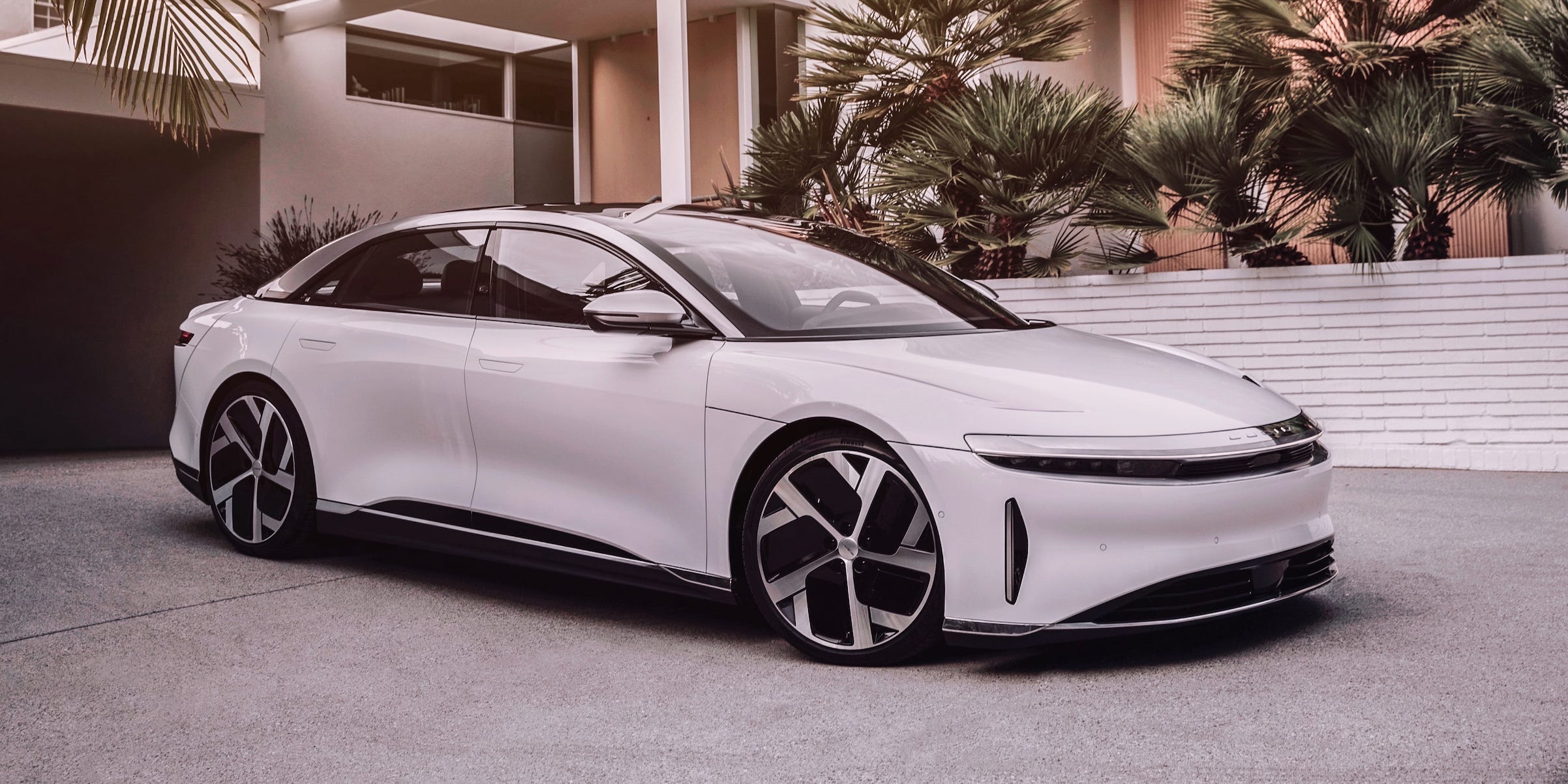- Electric vehicle startup Lucid Motors plans to go public via SPAC at a $24 billion valuation.
- The company struggled for years before getting $1.3 billion from Saudi Arabia in 2019.
- The deal increases Saudi Arabia’s ownership stage from 67% to 85%.
Somewhere out there, there’s a graveyard of Tesla rivals – metal skeletons of electric cars that tried and failed to challenge Elon Musk.
Lucid Motors probably would’ve been one of them, had it not been for Saudi Arabia.
After struggling for years, Lucid Motors was saved by a $1.3 billion investment from Saudi Arabia’s sovereign wealth fund in 2019. The huge sum gave the Saudi fund a 67% stake in the company, according to Wired Middle East.
Flash forward to today and Lucid Motors is set to go public with the largest-ever SPAC deal, pocketing $4.4 billion at a valuation of $24 billion. It will increase Saudi Arabia’s ownership to 85%, according to the company’s investor presentation.
Lucid Motors announced late Monday that it will merge with Churchill Capital Corp IV, the SPAC run by investor Michael Klein. It’s the latest in the SPAC craze, which has been a popular option among electric car companies such as Nikola and Fisker. Investors in Churchill Capital Corp IV include Millennium, Citadel, and Blackstone.
Although there’s been a boom of electric vehicle startups in the last few years, it’s proven difficult and costly to turn pipe dream designs into viable models. Lucid Motors, however, has actually built a entire factory in Arizona to mass-produce the Lucid Air, its initial luxury sedan priced at around $70,000.
CEO Peter Rawlinson is confident the Lucid Air can take on Musk.
“We’ve got more advanced technology than Tesla,” he previously told Insider. He estimates the company’s technology is 17% more efficient than its closest competitor.
But despite its new massive valuation, Lucid Motors hasn’t had an easy journey.
The path to a $24 billion valuation
Rawlinson originally worked at Lotus and Jaguar, before leading vehicle engineering at Tesla. He was a chief engineer for the Model S, before leaving in 2012 to care for his mother.
Musk was not happy.
“Rawlinson didn’t design Model S,” Musk tweeted in 2020. “Prototype was done before he joined & he left us in the lurch just as things got tough, which was not cool.”
One can imagine Musk was even less thrilled when Rawlinson joined Silicon Valley startup Atieva a year later. The company was in the middle of switching from supplying batteries to producing electric cars.
It became Lucid Motors in 2016, and set out to develop a luxury electric sedan. However, the company struggled for years to secure funding. As The Verge reported earlier this year, Lucid Motors was forced to take on loans from an Arizona hedge fund and a Chinese electric bus company to continue operating.
Then Saudi Arabia stepped in.
Saudia Arabia’s Public Investment Fund (PIF) gave Lucid Motors a staggering $1.3 billion, which it used to build its $700 million factory in Arizona.
Saudi’s investment was likely part of Crown Prince Mohammed bin Salman’s 2030 Vision, which declared the country’s push towards green energy. Saudi Arabia even initially tried investing in Tesla, before Musk’s famous “secured funding” tweet likely spoiled the deal.
—Elon Musk (@elonmusk) August 7, 2018
Many Silicon Valley companies like Uber and Slack happily took Saudi money as well at the time, but the investment in Lucid Motors became particularly awkward.
A few weeks after the deal, Saudi Crown Prince Mohammed bin Salman had journalist Jamal Khashoggi assassinated, according to an ultimate finding by the CIA (Saudi officials have denied the crown prince’s involvement in the murder.)
The fallout from the events prompted a reckoning in the tech world. Many companies took a closer look at Saudi Arabia’s history of human rights abuses and didn’t like what they saw. Richard Branson’s Virgin Galactic left $1 billion of Saudi money on the table, and prominent VCs and founders decided not to attend Saudi Arabia’s popular Future Investment Initiative conference.
However, Lucid Motors chose to retain their Saudi partnership. Rawlinson said the company would be a positive influence on the nation.
“I think that we can be part of a movement which could catalyze change for good. That’s what I see,” Rawlinson told The Verge in November 2019. “We have a partnership – which is very aligned – a partnership with the PIF. It’s a strategic partnership. They’re committed to help us make this change to benefit all mankind. And it will benefit Saudi society.”
Dr. Robert Mogielnicki, a resident scholar at the Arab Gulf States Institute in Washington, says that, although there is “a genuine economic and social transformation underway in Saudi Arabia,” these huge investments in US companies may have other benefits as well.
“As Saudi government officials confront increasing political pressure from Washington, they may well point toward various commercial partnerships as evidence of shared economic interests,” he said.
Lucid Motors recently received an additional $600 million from the PIF to keep the startup running until the SPAC deal closes.
The company will use the $4.4 billion it receives from the deal to accelerate its growth and expand its Arizona factory to eventually produce 365,000 units per year, according to a press release.
